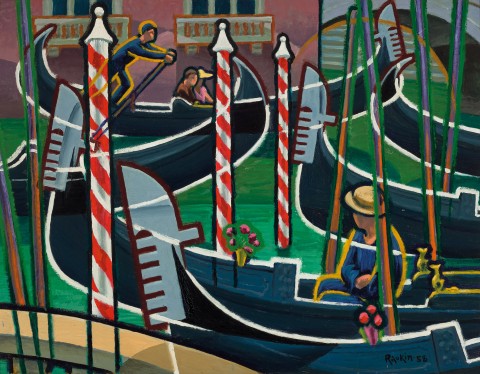GONDOLAS, 1958
WEAVER HAWKINS
oil on composition board
60.5 x 77.5 cm
signed and dated lower right: Raokin 58
Scheding Berry Fine Art, Sydney
Private collection, Sydney, acquired from the above on 23 August 1986
H.F. Weaver-Hawkins (Raokin) 1893 – 1977, Macquarie Galleries, Sydney, 5-24 April 1978, cat 37
H.F. Weaver-Hawkins (Raokin) 1893 – 1977, Macquarie Galleries, Sydney 1978, exhibition invitation, colour illustration inside cover
McIntyre, A., ‘Weaver Hawkins – a tribute to a pioneer’, The Australian, Sydney, 15 April 1978
Australia has produced a small number of artists whose technique is undeniably their own, including individuals such as Brett Whiteley and John Olsen. A further name is Weaver Hawkins whose bold colours and rhythmic pictorial compositions built on his early training in England at a time of great artistic revolt, fanned spectacularly by the Vorticists, whose Cubist-inspired ideas left a lasting legacy within Hawkins’ work. He was also drawn to ‘compositional theories as Dynamic Symmetry, Platonic Solids, Magic Squares and the Modular’;1 which resulted in him becoming ‘one of the finest and most original mid-century painters working in Sydney (painting and exhibiting) for forty years.’2 In Gondolas, 1958, Hawkins’ love of vorticist design turns the otherwise touristy motif of gondolas into a charged mandala of pattern within pattern which speaks directly to the lively movement of the gondoliers and their craft.
Underscoring Hawkins’ meticulous work is the devastating knowledge of his physical disabilities. A soldier during World War One, he was severely maimed by shrapnel and shot several times before enduring a two-day crawl back to safety. More than twenty operations were then undertaken on his arms – both elbow joints were removed – leaving him with a withered right and a barely functional left. A natural right-hander, he trained himself to use his left, supported by the right, first by mastering drawing and then, unbelievably, etching with beautifully and sensitively drawn results. His poignant Self portrait, 1920 (Art Gallery of New South Wales) is an exquisite early example. He held his first solo exhibition in 1923, but due to press notices which emphasised his disability, he adopted the art-name 'Raokin' to divert attention. After some years living the expatriate life in Europe, Hawkins migrated to Australia with his young family in 1935, moving to Mona Vale, one of Sydney’s northern beach suburbs. Their precinct became known as the ‘mad half mile’ for its high concentration of artists, theatre directors and writers, including Rah Fizelle and Arthur Murch, who lived next door.
He loved Mona Vale so much that his wife Rene had to force Hawkins to travel back overseas for an eleven-month journey through Europe over 1956 – 57 where he sketched the inspiration for Gondolas en route. Due to his arms, each painting was a slow process, supported by ‘a number of quick sketches… followed by a more detailed ink and wash sketch, then a full watercolour study... he also sometimes painted a small oil sketch before beginning the final work.’3 One such study of Gondolas was included in his posthumous 1978 exhibition at Macquarie Galleries and in a review of this exhibition, the painting (this lot) was singled out by one newspaper critic who was impressed by Hawkins’ ‘dominating concern for areas of flat bright colour with hard edged shapes (where) spiralling linear patterns carry the eye in, out and around the compositions.’4 The Art Gallery of New South Wales owns another work from the European journey, In Lisbon, 1958, which features a birds-eye view of a descending staircase. In a similar manner, Hawkins’ pronounced use of directional lines in Gondolas draws the eye ceaselessly through the interlocking patterns and design anchored at their centre by the pair of bold, red-striped poles.
1. Thomas, D., ‘Weaver Hawkins’, Project 11: Weaver Hawkins, Art Gallery of New South Wales, Sydney, 7 February – 14 March 1976
2. Radford, R., ‘Foreword note’, Weaver Hawkins 1893-1977: Memorial retrospective exhibition 1977 – 1979, Ballarat Fine Art Gallery, Victoria, 1977 (n.p.)
3. Chanin, E. & Miller, S., The art and life of Weaver Hawkins, Craftsman House, Sydney, 1995, p. 59
4. McIntyre, A., ‘Weaver Hawkins – a tribute to a pioneer’, The Australian, Sydney, 15 – 16 April 1978
ANDREW GAYNOR
